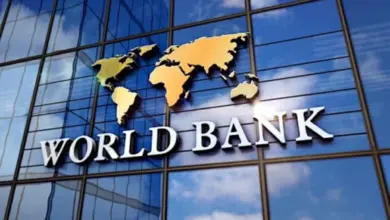Mahmoud Mohieldin, Egypt’s first-ever investment minister, appears to know how to take a joke–and a bit of criticism. Visitors to the minister’s Nasr City office are first shown into a waiting room where the walls are literally covered with framed newspaper caricatures of Mohieldin, some of them fairly unflattering. In one, he’s depicted as a snake charmer; in another, he’s the engineer on a speeding train labeled–of course–“Privatization,” as a panicked railway worker shouts: “Slow down or you’ll jump off the rails!”
For better or worse, Mohieldin knows his name will forever be associated with the sale of public assets, making him a natural villain to many Egyptian workers who view the practice as a threat to their security and futures. In a wide-ranging interview, Mohieldin defended his record and discussed his ambitious plans for the future.
AL-MASRY AL-YOUM: You just came back from attending the G-20 summit in South Korea. How was it and how was the mood there?
MAHMOUD MOHIELDIN: I don’t have any capacity to attend as a member or anything like that, but there was a policy seminar conducted by the Koreans in coordination with the World Bank that involved many ministers from South Africa, Egypt and many other countries…to discuss policies for the post-crisis global economy. What was repeated several times and very much shared is that there are some indicators and signals of recovery, but the recovery is very fragile. So it’s kind of a mixed view of the state of the world economy.
Having said that, there was an emphasis on four issues as far as growth is concerned.
First is that we need to take the issue of growth more centrally. The centrality of growth is becoming a priority now and whatever measures have been undertaken since the crisis, we need to readdress in a way that helps us get us back on the path of growth. Especially since many of the measures undertaken in light of increased budget deficits might be negative as far as the future of long-term growth is concerned.
Second: the consideration of multi-polar growth–the role of China, India, Korea, Singapore, Brazil and the like for the future and the role of the South.
Third, there was talk about the issue of financial development, the role of finance and what kind of financial sectors we need. The issue of going back to basics. We don’t need financial sectors to be safe and sound, but we need them to play the role of mobilizers of savings from savers and allocating them to productive investments. What are the mechanics to do that? And what the financial structures and regulations that need to be put into place?
Number four is the issue of trade and the concerns with protectionist measures facing developing countries and developed countries as well, when many countries are adopting new techniques.
AL-MASRY: You recently made an announcement that the privatization program was drawing to a close. Is that correct?
MOHIELDIN: No.
AL-MASRY: Tell me where things stand then. Were you misquoted?
MOHIELDIN: Misunderstood or misinterpreted by some but not all. Because it was very clear that we are adopting what I call the asset management program for state-owned enterprises. From day one we said we are investing in some of the companies that are by their very nature government monopolies. It is very hard to replace a government monopoly with a private-sector monopoly. That is not really very wise to do–like in the case of Eastern Tobacco.
There are companies that are in trouble and no private-sector company can handle the cost of restructuring them, like in the cases of the spinning and weaving companies. We say we are restructuring them and we have been doing well in that.
Through that asset management program, I’m happy to tell you that the public banks which we owed them LE32 billion in non-performing loans are getting every penny back. By this month, this chapter is going to be closed forever.
The second thing is that this portfolio that was netting losses of LE2 billion until 2004 is now netting profits of LE3.9 to LE4.9 billion expected this year, thanks to the reform of the debts and settling them, and the investments that we put at about LE20 billion in fresh investments.
In terms of privatization, we sold some companies. We managed to have the biggest wave of mergers and acquisitions are part of the restructuring. Now we are left with 149 companies. The strategy of the past–selling ‘lame ducks’ to strategic investors–didn’t really prove recently that this is the best way.
There is a great deal of social cost associated with it. There are concerns with the required action by any efficient private sector in terms of making many workers redundant or putting new discipline in the workplace that could really cause some trouble here or there.
So we said we are going to learn from 20 years experience in privatization. I’m welcoming all of the private-sector investments in green-field operations, but when it comes to what remains of the public sector. There are only 150 companies in a country that has 65,000 corporations. So it is not really the dominant monsters of the past. Their contribution to GDP is about 5 percent, no more.
I need to maximize the outcomes of the investment policies. I don’t really like to use the effort of the private sector on lost causes.
We are going to be having one of the biggest waves of privatization through the stock exchange, but when the market is much better.
AL-MASRY: You’ll be taking some of these 149 companies and putting them onto the stock market?
MOHIELDIN: Yes.
AL-MASRY: But not yet? What are you waiting for?
MOHIELDIN: Two things. Basically, as I said, for the market conditions to improve. Second, for a new law that I just finished to allow that to happen fully and adequately.
There are pillars of the new law that I’m happy to share with you. Basically we are creating an asset management agency, a professional agency to manage the whole issue of assets of public enterprises–including offering some of their assets to the public through the stock exchange.
Second, to establish a future generations fund by allocating some of these assets to the future generations that are touching them.
Third is to have the proceeds of whatever is going to be privatized allocated in one particular fund that is going to be used for spending on educational facilities, and health and the like–not to be mixed with the public money under the budget.
AL-MASRY: You mentioned some of the “social costs” of this transition. I’ve spent a lot of time interviewing protesters camped out on the sidewalks outside Parliament. And a lot of them were companies that were privatized and a lot of them–fairly or not–were blaming privatization. Is that something you struggle with?
MOHIELDIN: Well let’s discuss that openly. Some of these demonstrations have nothing to do with the production sector, be it public or private. You say you went there and I believe you. So you saw many departments and many agencies that have nothing to do with the public or private sector.
The majority of the cases are with the private sector, not the public sector enterprises that report to me. Some of them could have been privatized almost ten years ago. There is only one exception, which is the Tanta Flax and Oil Company. This is the only company that had been privatized recently. And because of a dispute between the workers and the investor, who happened to be an Arab investor, they went to the street.
I think the issue with the private sector has to do more with the inadequacy of the exit rules in the Egyptian system. So the issue here is what can we be doing with the exit rules at large. Some of the companies inevitably are bankrupt. And, as they say, if you have a market economy without adequate exit rules, it’s like having a religion without hellfire and paradise.
So we need really to have this mechanism of entry and exit. Actually, countries including mine have been very much focused on the entry rules rather than the exit rules. Our bankruptcy code is not adequate at all. The issue related to liquidation and the priority and privileges that should be given to workers if their companies are facing bankruptcy are not very clear.
So we dealt with this by agreeing on a fast-track proposal to have the financial rights of workers in the form of wages, salaries and other financial rights as the utmost priority when there is a liquidation case or a bankruptcy case of any company. This would really minimize the trouble.
AL-MASRY: In addition to handling privatization, one of your duties is attracting foreign direct investment. What are Egypt’s selling points, and what are the sectors that attract the most FDI?
MOHIELDIN: We have been doing well in attracting FDI as we have been doing well in attracting private-sector investment. When we started, private-sector investment in Egypt was only LE40 billion. Now, even after the crisis, we are talking about LE120 billion. This is the annual increase in private sector investment.
FDI was only US$2 billion. The average over the last three years is US$10 billion, with more contribution from the non-oil sector than there used to be. These were basically done through reforms. Egypt was ranked four times among the top-ten reformers by the IFC and World Bank, including the top reformer in 2007.
We have created this one-stop-shop. You are welcome to visit to see the ease of entry to the economy. What would take you three months before now takes you three days to get a company established.
This all attracts investors. Diversified economy, the location and the people–I would say those three aspects. The diversified economy: oil, non-oil, traditional agriculture and modern agriculture with export orientation.
Whatever had been nice and good before the crisis, might not necessarily be as attractive after the crisis. We are in a world of excess capacity.
But I can see three sectors that are attractive to investors: infrastructure; the renewable sectors including wind and concentrated solar power; and the third is more the portfolio kind of investment, and that is the small and medium enterprises.
AL-MASRY: There has been a lot of talk recently about raising the minimum wage. Is that something that affects your responsibilities? If the price of Egyptian labor goes up, does that make it a harder sell for you? Certainly inexpensive labor must be one of the attractive things about Egypt.
MOHIELDIN: At the end of the day, if you want to have sustainable growth and its benefits, you have to pay people adequately.
It’s always the golden formula that has all of the consideration to wages, not just out of fairness, but out of rights of the workers, and the issue of productivity. Whatever you are spending on training to improve the status of your workers is basically what will make your business more accepted in society at large.
If this country is adopting seriously the issue of corporate social responsibility, one of the main pillars of such CSR is workers’ rights. And workers’ rights are not just to talk about them nicely. It’s basically to give them their adequate wage and adequate salaries.
You should not really be exploiting the fact that this country has an unemployment rate of 8.5 to 9 percent to pay workers badly. I’m very happy with the recent wave of calls for decent jobs–not just jobs, but decent jobs that will respect wage rights and other rights of workers.
AL-MASRY: The minimum wage issue seems to have gained momentum in Parliament, right? It seems like something is going to happen.
MOHIELDIN: In discussion with trade unions and workers and management and government, there is always an equilibrium that needs to be reached. This equilibrium point is reached through bargaining, compromise and other considerations. So it may not really be as low as some of the employers would wish or as high as some of the activists would wish it to be. But it’s going to be better than expected.
AL-MASRY: We’re heading into a pivotal political stretch in Egypt, with parliamentary and presidential elections just around the corner. Basically, we’re entering a “What comes next?” stage. Does that affect your job, since investors want stability?
MOHIELDIN: All investors are after stability. No investment can thrive and do well in instability or, God forbid, chaos. This kind of political development in Egypt I see as healthy–to select presidents through election rather than referendum, the parliamentary vote, the local councils as well.
In terms of trends, I have a daily report that is submitted to my office here and we publish every week a report on the number of companies established in Egypt and the number of workers. I’m seeing steady growth of investments and newly-established companies. These companies are not really just coming to discuss the future of Egypt out of academic or philosophical concern. They are putting their money in. They are establishing companies today in order to start producing tomorrow.
AL-MASRY: You’re saying these people are betting on stability.
MOHIELDIN: Absolutely. Otherwise, they would not have bothered to invest. Those who subscribe to our long-term bonds, the 30-year bonds, are betting on stability. There could be some kind of tension because of these kind of political developments, some demonstrations, more vocal people in the media and on the satellite channels and the like, but this is very much acceptable. It doesn’t really harm business. And those who are coming from abroad may have such kind of things in their own countries.
Some people say, “Well we have seen demonstrations on Parliament Street,” or, “You have a strike.” You have those kind of things in all of these countries, including in China and, of course, the United States. Every other week there is a very big thing by unhappy workers somewhere.
AL-MASRY: Obviously politics here works a little differently than in the United States. Usually, in the last year before a US presidential election, everything slows down in government and it’s hard to push through major reforms. Is there any chance of that happening here? I know you have major plans.
MOHIELDIN: This year and next year I have the longest legislative agenda being submitted to Parliament. And not all of them are nice and non-controversial. The issue of reform is not just the wishes of reformers and some members of government. They have to be anchored to laws and decrees.
AL-MASRY: So what’s on the horizon?
MOHIELDIN: We’re going to be introducing a VAT tax law, to upgrade the general sales tax into a Value-Added Tax system. There is a new corporate code to adhere to the rules of corporate governance and to deal with the issues of exit rules.
We have a new law for financial-sector reform in terms of mortgage finance and the rules for the establishment of non-bank financial institutions, and a draft law for private health schemes as well.




